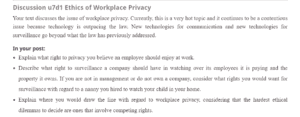Ethics of Workplace Privacy
Explain what right to privacy you believe an employee should enjoy at work.
In this age of technology development, the law does not cover many issues relating to employee privacy. Therefore, an employer needs to discern what is ethical and what is not about employee surveillance. Employees should enjoy the right to privacy when using their devices, such as mobile phones and other internet devices. Even when using the work networks, they should not be monitored on what they do in their personal lives. However, it is ethical for employers to monitor their devices, such as workplace computers, emails, and telephones. Employees should be ethical enough not to use these devices for personal purposes to avoid an infringement on their privacy.
Are you looking for an entirely new and genuine copy of “Ethics of Workplace Privacy”? Get in touch for any assistance.
Describe what right to surveillance a company should have in watching over its employees it is paying and the property it owns. If you are not in management or do not own a company, consider what rights you would want for surveillance about a nanny you hired to watch your child in your home.
Employers should be able to monitor the devices that they provide their employees with within the workplace, such as mobile phones, telephones, computers, and their provided emails. Employers also have the right to monitor information for quality control and to protect their organizations, among other reasons (Nord, McCubbins, & Nord, 2006). However, when this monitoring is done, the employees should be informed. For instance, when a nanny is being monitored at home, the employer should inform them that their actions will be monitored. This awareness helps them to protect information that they feel should be private.
Explain where you would draw the line regarding privacy, considering that the hardest ethical dilemmas to decide on are one meeting right. Where to draw the line on workplace privacy
An employer can draw the line on privacy when employees engage in activities that are harmful to the business. While it is ethical to ensure the right to privacy is respected, employers also must protect their businesses from harm. For instance, if an employee is using work networks for personal reasons, exposing the business networks to cybercrime, then the employer has a right to intervene in this action and revoke the right to privacy.
Other Related Post: Examining Communication Strategies
References
Nord, G. D., McCubbins, T. F., & Nord, J. H. (2006). E-monitoring in the workplace: privacy, legislation, and surveillance software. Communications of the ACM, 49(8), 72-77.
ORDER A PLAGIARISM-FREE PAPER HERE
We’ll write everything from scratch
Question
Discussion u7d1 Ethics of Workplace Privacy
Your text discusses the issue of workplace privacy. This is a very hot topic and continues to be a contentious issue because technology is outpacing the law. New communication and new surveillance technologies go beyond what the law has previously addressed.

Ethics of Workplace Privacy
In your post:
- Explain what right to privacy you believe an employee should enjoy at work.
- Describe what right to surveillance a company should have in watching over its employees it is paying and the property it owns. If you are not in management or do not own a company, consider what rights you would want for surveillance about a nanny you hired to watch your child in your home.
- Explain where you would draw the line regarding privacy, considering that the hardest ethical dilemmas to decide on are competing rights.
Refer to the Discussion Participation Scoring Guide for posting expectations.
Discussion Participation Scoring Guide
| Discussion Participation Grading Rubric | ||||
| Criteria | Non-performance | Basic | Proficient | Distinguished |
| Applies relevant course concepts, theories, or materials correctly. | Does not explain relevant course concepts, theories, or materials. | Explains relevant course concepts, theories, or materials. | Applies relevant course concepts, theories, or materials correctly. | Use examples or supporting evidence to analyze course concepts, theories, or materials correctly. |
| Collaborates with fellow learners, relating the discussion to relevant course concepts. | Does not collaborate with fellow learners. | Collaborates with fellow learners without relating the discussion to the relevant course concepts. | Collaborates with fellow learners, relating the discussion to relevant course concepts. | Collaborates with fellow learners, relating the discussion to relevant course concepts and extending the dialogue. |
| Applies relevant professional, personal, or other real-world experiences. | Does not contribute professional, personal, or other real-world experiences. | Contributes professional, personal, or other real-world experiences but lacks relevance. | Applies relevant professional, personal, or other real-world experiences. | Applies relevant professional, personal, or real-world experiences to extend the dialogue. |

